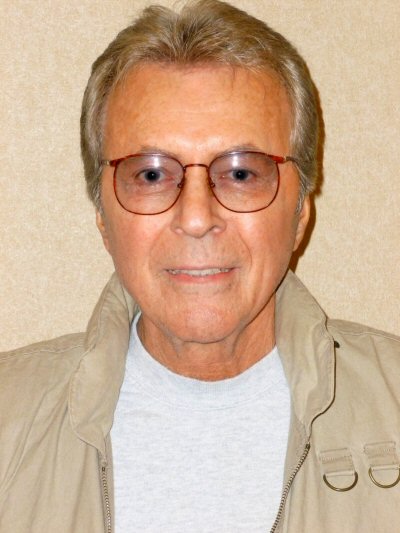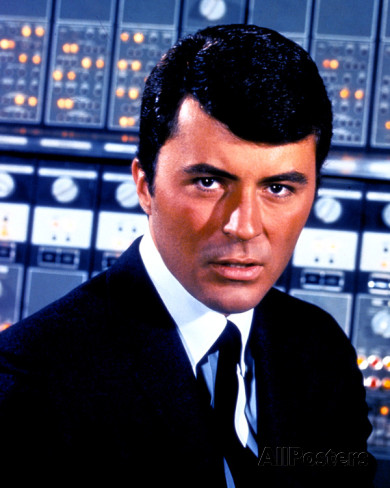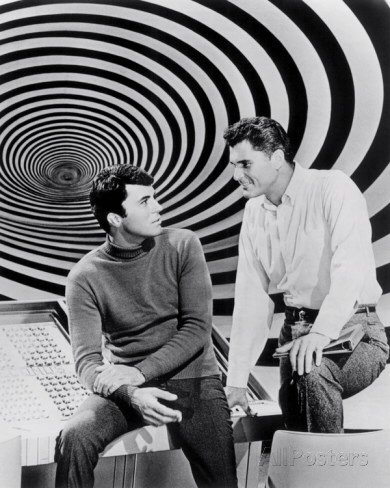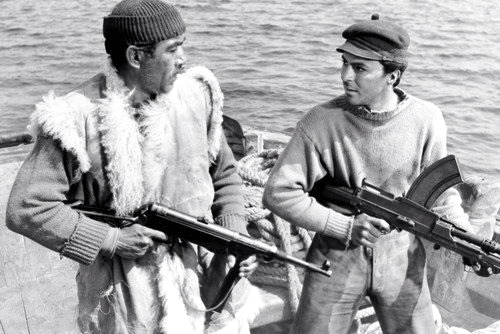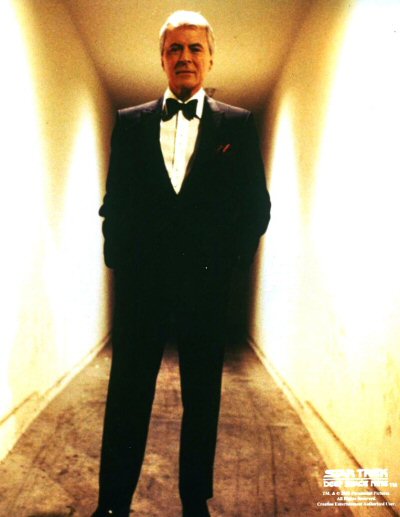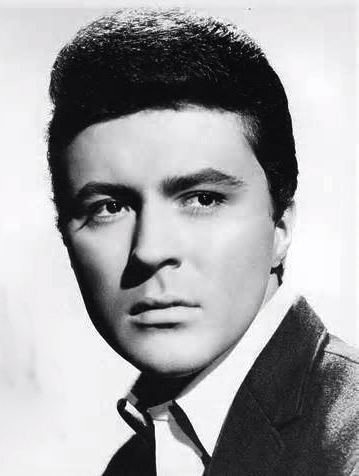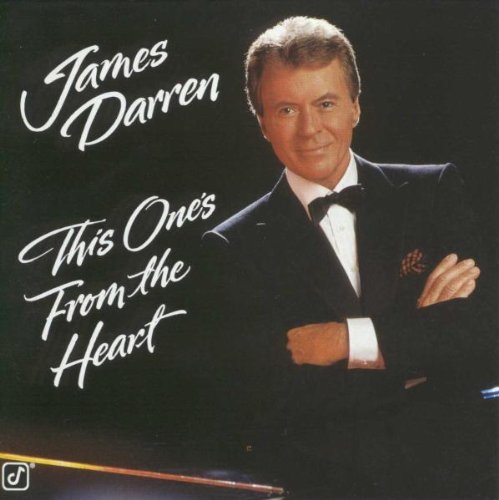JAMES DARREN:
I think I was just a born ham. I loved play-acting. Not so much in school and stuff like that, because, actually, I was extremely shy. But I would do things, which were kind of bizarre, I guess, in a sense, but I would take toilet tissue, wet it and mold different features on my face. I was living with my grandparents and my Mom and Dad and my brother John. And I would then go out the back door and walk down the neighborhood and knock on neighbors’ doors. [Laughs] And they thought I was weird.... which of course, I was. So I was trying to convince them I was somebody else. So I was always an actor. I guess I was born an actor. I loved trying to convince people that I was someone other than myself. PCC: And then studying with Stella Adler, one of the elite drama coaches... DARREN: I had read a lot about Stella Adler, after reading about Marlon Brando and a lot of other wonderful actors who had studied with her. Or with the Actors Studio. So I got her number, maybe through information, I can’t remember. Her acting school was 50 Central Park West. And I called and I set up an appointment for an audition. I went in there, I auditioned. And they accepted me. And I studied with her for two years. PCC: So that was ‘The Method’? DARREN: Yeah, it was the Stanislavski method, which she used, because she was part of the Actors Studio at one time, she and her brother Luther. The entire family was an acting family. But she was a wonderful coach. She was tough. You couldn’t play around. You’d better be prepared with her. And I’d go there twice a week, first by train, from Philadelphia, and then I bought a motorcycle, unbeknownst to my Mom and Dad. When I was about 16, I bought this little Zundapp motorcycle. It was a German bike. And I’d take my motorcycle up there. And it was great. It was wonderful. It was a great experience. I was fortunate to study with someone of that caliber and with that talent. PCC: And then you had that intense, rebel, delinquent role in “Rumble on the Docks.” Were they trying to paint you as a new James Dean type? DARREN: No, I don’t really think so. It’s interesting - after having been with Stella for two years, I went to see agents and they all said, “You need to have photographs.” So I’m walking down Broadway one day, after class, and there’s a zillion photographers, photography shops, And I chose one at random - Maurice Seymour. I went and made an appointment to have pictures taken, had them taken. And his secretary, whose name was Yvonne Bouvier, French woman, said to me, “You know, you photograph pretty well. Are you interested in getting into acting?” And I said, “Yeah, of course, I am. What else would I be doing? I don’t want to be a carpenter or a plumber. Yeah, of course.” So she introduced me to Joyce Selznick, who was actually working for Screen Gems at the time, but had, prior to my knowing her, discovered Tony Curtis. I met with Joyce. A few days later, she said she was going to set up a meeting with me and Columbia Pictures. She was a great salesperson. And I signed a contract with Columbia. She sold me. She sold me to them. PCC: And your performance in “Rumble on the Docks” got a big reaction. DARREN: Oh, what happened was, when I got to California - my brother Johnny came out with me - Sam Katzman, who was a producer, for a lot of those early, six-day westerns, had a project called “Rumble on the Docks” and being under contract, you don’t have much choice of anything. You know what I’m saying? They say you’re going to do a film and you do it. And luckily for me, it was something I wanted to do. I liked it. It was very important in my career. In fact, it was just on TCM, Turner Classic Movies, “Rumble on the Docks,” which I thought was fun. PCC: Even though it was winding down in that period, was it still an advantage to be part of the studio system? DARREN: Yeah, a giant advantage, because then I was working with an acting coach called Benno Schneider, whose wife [Batami] was also in the Actors Studio. And he was a wonderful coach. I was under contract a long time with Columbia. And the people there, Leo Jaffe, Abe Montague and Paul Lazarus, all the people, Harry Cohn, Harry Romm, who was the man who signed me, they were all very kind to me. And yeah, you have an advantage, sure. They’re teaching you a lot. Or they’re allowing you to learn a lot, as much as they’re teaching you. So being under contract had its advantages, it really did. A lot of people say, well, you didn’t make much money, which I didn’t, but, hey, that really didn’t matter. The fact that I was getting all the attention and great support from those people was what was important. So you have to look at the other side of the equation here. You’re under contract and, granted, you’re making very little money. But what’s important is that you’re getting the training. You’re at a major studio. You have the opportunity to see a lot of tremendous films being made. That’s where I met Sinatra, he was doing “Pal Joey.” I was down there every single day. I loved it. And I’ll tell you, all those people that I was under contract to, those people I mentioned earlier, they were all so supportive. They were like my family. And Joyce Selznick. God bless her. I would never be in the business, if it hadn’t been for her. PCC: And early on, the fan mail started pouring in.
Oh, yeah, when I did “Rumble on the Docks, and that movie was released, I started getting a lot of fan mail, like about 500 letters a week, which was a lot. I mean, it was a movie that was not “Gone With The Wind.” It was an inexpensive movie. So then they build you. Then you go from one picture to another. I did “Let No Man Write My Epitaph,” of course, “Gidget.” “Navarone.” I was very lucky that I had that support of all those wonderful people and a major studio behind me. PCC: You gave a memorable performance in “Let No Man Write My Epitaph.” What was it like being around that cast? DARREN: You know, you’re as good as the people around you. And as good as the director and the writer. Without a good script, there’s nothing, number one. And without a good director and a good cast... it follows from the writing to the directing to the cast. To work opposite Shelley Winters and Ricardo Montalban and Jean Seberg - an absolutely gorgeous woman - and Ella Fitzgerald, that was, I believe, her first film. And Ella was quite nervous. Every day. You had to come in and give her big hugs ever day, just to put her into a comfortable zone. And we all loved her and were supportive. Such a modest woman. And the most incredibly talented person you could ever hope to meet. I can’t think of anybody who’s a better singer. You can be incredibly talented and still have humility, which she did. I saw her occasionally after that. I saw her years later, backstage at Caesar’s Palace in Las Vegas. She said, “Oh, Jimmy, I’m so scared.” I said, “Of what?” She said, “They’re not going to like me.” I said, ‘You’re right, Ella. They’re not going ot like you... They’re going to love you.” And she gave me a big hug and kiss. And they played her on and she stepped on stage and the audience went crazy, and, of course, out came that beautiful voice. Frank was a very confident man. But he still... every performer is a little apprehensive about going before an audience, because, number one, is my voice going to hold up? Number two, are they going to like me? We all have that same worry. What do I have to sell? My voice. That’s it. If my voice is screwed up, that’s it. It doesn’t work. And Burl Ives, of course, was in the movie. Those people, you just play off of. And they make it easier. Do you know? You know where you are. You know your character. And to deal with these actors, like Shelley, or like Burl, Ricardo... here’s a decent analogy - If you’re going to learn the game of tennis, don’t play with somebody who’s worse than you. Play with somebody who’s better than you, because it brings your game up. Every time I played tennis and I played with a pro, I was 100 times better than I was when I played with somebody who was my equal or lesser. You strive to be better, when you’re playing with someone who’s a great player. And when you’re acting with Shelley and those people I mentioned, or “Navarone” with Peck and Niven and Quinn, you’d better hold your own. You try like hell to hold your own. PCC: Shelley Winters could be quite a force on the set, couldn’t she? DARREN: Shelley? Oh, yes, she was. And so was Burl, as a matter of fact. Shelley was a special person, as was Burl Ives. They had their own definite feelings about things. And they were hard to sway. Not that you’d want to, because they were right in what their opinion was, what their choice of what they did was. They were great people to work off of. In acting school, not so much with Stella, because there were a lot of very good actors, that were in my class, anyway. But when I was studying at Columbia, they had a lot of newcomers, which I was also, but they were not nearly the quality of actor that we had in Stella’s class. Maybe they were just too young or maybe they were not just as good. I mean, there were great people there, too. Jack Lemmon was an incredible actor. Cliff Robertson, also, a wonderful actor. But, for the most part, again, you’re working with people that are on your level. And you want to work with somebody better, someone who was a better actor than you. PCC: Jean Seberg, tragic figure, but a very special aura on screen. DARREN: She was great. There’s a magic that those people have. She was physically gorgeous. But there was a magic from within her that’s so truthful. It’s so real. Acting is an interesting thing. You try to be as real as you possibly can, without making it look like you’re acting. There are actors today, I feel like I don’t like them at all, because I see them acting. It’s dreadful. Thank God, most of the actors today are so wonderful... and so understated. Especially when you’re working in film, as opposed to theatre. I don’t know that I would be a good theatrical actor, live, because I was trained in the film part of it. That’s, I guess, where I’d be at my best. Some people can go from film to theatre and be equally as good, and vice versa, theatre to film. Like Brando, of course. But I don’t think I’d be a good stage actor. I like it. I’ve done it. I’ve done summer stock and enjoyed it very much. But the technique is a bit different. The character is not different, but the expression of that character is a bit broader. You have to know how to do it. It’s not accidental. It’s a technique. And you have to know how to do it. PCC: After powerful dramatic roles, you made a huge impression with a lighter picture, “Gidget.” That on-screen chemistry, did it reflect a personal connection you felt with Sandra Dee?
Yeah, I happened to really adore Sandra as a person, as well. And she was, again, very honest in her acting. So when you’re getting that, as an actor, it’s something you can feed off of. You react to it. You listen. I mean, a big part of acting is listening. I think of movies like - talking about people being understated - movies like “Rain Man” or “Midnight Cowboy.” Dustin Hoffman was, of course great in both of those films. But very little credit, not the amount that was due, went to Tom Cruise or Jon Voight, because it looked so easy. But that’s much more difficult than playing somebody with an affliction. You don’t have a little crutch thing to hang onto. Voight was brilliant in “Midnight Cowboy.” And I thought Tom Cruise did a wonderful job, as well, in “Rain Man.” It’s like Montgomery Clift, very understated actors, not unappreciated by any means, but understated, brilliant. Paul Newman was a killer actor. And Monty Clift was my favorite actor of all. PCC: Clift was a riveting actor, but because he was less showy, doesn’t always get the kind of attention Brando does. DARREN: Yeah, it’s interesting. That’s funny, because, when I was directing television later, these actors would come in and they’d read for me and the producers. And some were very understated. But remember, we’re on film now, and we have a camera, so you can get as close as you want. You’re reading the eyes. You’re reading the faces. And I would say, “Wow, that person was wonderful!” And lots of times the producers would say, “No, they didn’t do anything,” which is all b.s. They did do something. They did more than what the hell you think they did. Like I said, you have a camera, they don’t have to go over the top, which a lot of them did. So going back to what I said earlier, if you see somebody who’s acting, he’s usually not a good actor. PCC: And that’s true sometimes of very acclaimed actors. DARREN: Yes. Oh, yeah. I could mention a couple of names - which I won’t - but some guys who have done beautiful things early in their careers and I see them today and they’re hamming it up, mugging it up. I just don’t get it. Now, Al Pacino, who is one of my very favorite actors, stretches a hell of a lot, which I love. He’ll go over the top sometimes, but I like that, because you know, as a director, you can always bring them down a bit. You know what I’m saying? He’s a brave actor. And he’s a wonderful actor. I love Pacino. And he never prostituted himself. He did what he wanted to do. He didn’t do a lot of trash stuff that some actors do. Why they do it, I’ll never know, when they’re already successful, have enough money. But Pacino always does whatever he wants to do. And even when he does go over the top, I absolutely love it, because it’s still honest. PCC: As far as the music, Sinatra was one of your big heroes, meeting him, was it intimidating at first? Or did he put you at ease right away? DARREN: I was very much at ease. I met him on the set of “Pal Joey.” And I’d admired him for years, since I was a young boy. I always played his music and I loved it, as well as the records of Frankie Laine. But no, it wasn’t intimidating. He didn’t make you feel intimidated. On the contrary. His attitude was always very friendly and warm. He was as normal as anyone else. We all have moments when we may not be as friendly. I know I do. Most of the time I’m very friendly, but sometimes I’ve got my own problems, as well. But I had a great time with Frank. I loved his talent. I loved him. He was a special human being. He had an incredible family - Nancy, Tina, Frank, Jr. and Nancy Sr. Nancy Sr. is just adorable. She’s like my second Mom. And, of course, my godchild, I must mention her. Nancy’s daughter, A.J., is my godchild. She has a new baby, Amanda, who’s absolutely adorable. PCC: What was it about Frank’s talent that made him so timeless? DARREN: I wish it was something we could define. I mean really define. His voice is unbelievable. It’s got warmth. When Frank Sinatra sang a song, if it was a happy song, the man would put you in the best mood. If it was a sad song, it just tore your heart apart. He had a God-given gift. And technically, of course, he was brilliant. His breath control, phenomenal. But more important to me than that was the fact that he communicated the meaning of the song so well. You felt it. You really felt the song. He gave the message to you. For me, no other singer could do that as well. PCC: Were you able to learn things from him that you could apply to your own singing? DARREN: The thing is to believe it - believe what you’re singing. Like you believe what you’re saying, if you’re an actor. Frank was an actor of course, but a singer long before he was an actor. And he believed every word he was singing. You could tell. It translated to the audience. There are lots of wonderful singers around, but, to me, no one like Frank Sinatra - not because I love him and I love his family. Before I ever knew him or his family, I thought he was phenomenal. He had such a darn special gift that so few people have. I used to tell Nancy - “Your Dad must have six lungs,” because he could hold a phrase, like it was astonishing. You’re thinking, “My God! How could he have that much breath? How the heck does he do that?” There’s no explanation for it, except that he had that God-given gift. It was something he was born with. PCC: It must have been validating for you, the fact that he was supportive of your talent.
Sure, he was very complimentary. I remember being at Nancy, Sr.’s, one day, with Nancy, Jr., and Frank came by and he said, “I just heard your record on the radio, a song called ‘All,’ and the thing that I thought of was, “Holy shit! Frank Sinatra listens to the radio!” [Laughs] You don’t see that, you know what I mean? But he was very aware of everybody. He was extremely well read, a very bright man. And he was aware of every bloody singer - actor, singer, whatever, no matter who. You’d think, “How could Frank Sinatra know about this guy or that guy? “ He knew everything. He was curious and educated in the business. He had the knowledge of the business, the history of the business. And young people, people just coming up. And so, he said, “I heard the song. I really liked it.” That was quite interesting. He was an incredible influence on me. The thing I’ve tried desperately not to do... because no one is ever going to be... I mean, I’ve heard people try to sing like Sinatra. And it’s a joke, because no one can. The only person who is close to singing like Sinatra, honestly, is Frank, Jr., because Frank,.Jr., is, genetically, Frank Sinatra. So he doesn’t even have to try. He sounds like his Dad, the same timbre, everything. But what I do, purposely, if I’m going to record, I don’t listen to his records like for a month before, because I don’t want to be so influenced by him. I sometime try to fight it. But in fighting it, I don’t want to lose who I am. You know what I mean? PCC: It’s ingrained in you. DARREN: Yes, it is. It’s ingrained in me, exactly. So I don’t want to try to be so different that I lose my identity. I want to sing like me. And that’s what I try to do. But like I said, Frank was the greatest. And he influences me in the sense of how I would interpret a song, thinking how he would interpret a lyric... and the rhythm. It’s like almost through osmosis, in a sense. I worked with an incredible talent, Buddy Hackett for many years, 12 consecutive years. We worked together. We lived together at times. Buddy Hackett was the greatest influence on me, as a performer, through osmosis, through working with him for all those years. We worked 40 weeks a year together. And his timing, which was impeccable, was part of me. I’d come off stage sometimes and say, “Holy shit! I sounded just like Buddy!” I mean, not audibly sounding like Buddy, but my timing was Buddy. My delivery was Buddy. And it’s only because he was my teacher. When we worked together, I would open the show. He would come out during my show, whether it be after the second, third, fourth song, whatever. And we would do a stand-up, he and I. I was the straight guy. It was like Abbott and Costello. And, on the Carson show, he once said, “There are three great straight men in the business - there’s Dan Rowan, there’s Dean Martin and there’s Jimmy Darren.” It was an incredible compliment, especially coming from him. But I learned it from him. By the way, in the 12 years, we never had one mean word. Never. Not once. Not one angry moment. Not one moment where he was upset with me or me with him. After the first time we were on stage together, he told me, “I want you to do one thing - don’t try to be funny.” He said it matter-of-factly. “Don’t try to be funny. I want you just to answer me with total honesty.” And that’s what I did. There can only be one comic up there. I’m crazy anyway. I do funny things, say funny things. But working with Buddy, and working as a team, as an Abbott and Costello or Rowan and Martin or Dean and Jerry, you needed to have a straight guy. He’ll ask me a question to set out in a direction that will be humorous or interesting. If I try to be funny, I’m defeating the whole purpose. You don’t need six wings on an airplane. So he was my teacher, no doubt about it. And Frank was my teacher vocally, as far as interpretation of songs. PCC: You mentioned the song “All.” I think that was one of the best pop records of the 60s. And then you had “Mammy Blue,” which was a great album. Was that a great feeling to be able to make some records that would really allow you to showcase your voice? DARREN: You know, it’s interesting, because, I mean, I'm blessed. When I did “All,” I was at Warner Brothers. And there was a gentleman, Richard Glasser, Dick Glasser, who was my producer. He chose the music, he recorded it. So I was fortunate that I had him. When I did “Mammy Blue,” I was with Don Kirshner. And Don and his group were the people who chose the music. So I was surrounded by good people. And when you’re lucky enough to have these people with you, and be your partner, then you’re doing okay. So first of all, I was given good material by Dick Glasser, good material by Kirshner and the people that worked for him. And it was produced really well. So I was in a very good position. I was fortunate. So I’ve been lucky. I’m a lucky guy. Listen, you can have a lot of talent and nobody will ever know it and you’ll never be able to express it, if you don’t have good people around you. If you have great people around you, who know how to produce you, how to choose the right songs for you and you have the talent to interpret it, then you’re doing it the right way. You try your best and hopefully it comes out right. These people knew me well enough. They said, “Jimmy Darren could do ’Mammy Blue’ in a heartbeat. He could do ‘Come Fly With Me’ in a heartbeat.” Or “I’ve Got You Under My Skin.” That’s an extension of me, of Jimmy Darren. I mean, they wouldn’t have given me a rap tune, because I couldn’t do it. As good or bad as it may be, I couldn’t do it. PCC: Prior to the success of the “Gidget” songs, the theme song and “The Next Best Thing To Love,” were you thinking of a career singing, as well as acting? DARREN: That was all Columbia Pictures. “Gidget,” remember again, I was surrounded by incredible people, by Stanley Styne [lyricist], who was Jule Styne’s son, Freddy Karger, a wonderful writer [composer], Billy May, who’s an incredible arranger, John Williams, an incredible orchestrator [later renowned for scores for “Star Wars” and other films], Shelley Manne on drums, Manny Klein on trumpet. Recorded at Capitol Records. You’d have to be pretty bad, for this not to come off. You know what I mean? You’re surrounded by incredible talent. And the good thing was, we all dug each other. We loved each other. And they loved the way I sang. That encouraged me even more. “Hey Jimmy,yeah, that was it!” One of the last things I did was for the Concord jazz label, Rick Baptist, who was lead trumpet player, I’d come out of the vocal booth and he’d say, “Yeah, babe, that’s it, man. You got it! You nailed it!” Because he’d heard me through the headphones or whatever. So it’s encouraging when your peers, people that you, number one, respect tremendously, and are incredibly talented, tell you, all that does is improve your performance. If you have a child, what do you tell your child? You’re doing that wrong? This is bad, it’s terrible? You say to your child, “It’s great! And if you do this, it might be even better. Try this, try that.” And I had that from these people I worked with on the “Gidget” tune, because I certainly wasn’t as good, let’s say - for lack of a better word -as good then as I was five years after or 10 years after... or today. I learn every day. PCC: After working with Sandra Dee on “Gidget,” you were sometimes confused with her real-life husband, Bobby Darin? DARREN: Oh, yeah. They didn’t think about the fact that his name is spelled differently... or that his real name is Robert Walden Cassotto or that mine is James William Ercolani. We had a lot in common - the fact that we were both singers, both actors, both of Italian heritage, both from the East Coast, a lot of things. But the names sounding the same way really created the confusion. Not that it was a detriment in any way, because Bobby and I had fun with it. PCC: Did you have any inkling prior to the movie’s release, that “Gidget” was going to be this phenomenon, spawning sequels and a TV series? DARREN: Not a clue. I thought “Gidget” would just be another movie, that it would be over and done and forgotten, not that it would have the longevity that it’s had. I mean, it’s incredible. It was made in 1958, ‘59, and it’s as popular today. I’ve worked Las Vegas and I had people bring their children in to see me. I worked the Performing Arts Center and there are young people in the audience, 13, 14 years old, mostly young ladies, young girls. And they love Gidget. They love Moondoggie. The story was good. The script was wonderful. The characters were terrific. I mean, how could you not fall in love with Sandra Dee? And how could you not feel, as a young girl, this love, this crush she had for Moondoggie? People relate to that, at certain ages they do. PCC: And dealing with the whole teen idol thing, was that fun for you?
It’s a big ego trip. When girls tear down doors to get to you, literally, it’s pretty interesting. And who the hell wouldn’t like it? [Laughs] You have all this adulation. What’s there not to like? How could you not like it, when people come up and say, “Oh, I love you. Oh, you’re so wonderful!”? What’s not to like about that - to be appreciated? What’s not to like about that? PCC: Having all that adulation so early in your career, how did you remain so well-adjusted? DARREN: Well, it’s just a part of your life. Your life is really your family, your mom, your dad your grandparents. I was raised by all of them, my uncles and aunts. There were nine of us, living in one home. My children, my grandchildren, that’s what’s important. I mean, this is a gift that God gave me - I’m able to sing and act. But getting down to the nitty-gritty, it’s your family and friends. That’s what life is. Getting up there and singing your song, and enjoying it, is gratifying. But life is having people that you adore and adore you, who would give their lives for you - your grandparents and your parents. It’s can’t be better than that. PCC: You mentioned Shelley Manne earlier. He was in “The Gene Krupa Story” with you. A lot of music heavyweights participated in that one. DARREN: Oh, yeah. I met Gene. He was on the set a lot. He was great, a down-to-Earth guy. And Sal Mineo, who played Gene Krupa, was phenomenal. Sal wasn’t a drummer. But you would swear to God he had been a drummer. He played. He looked like Gene, for Chrissakes. He looked like Gene behind those drums. He played them like he had been playing them for decades. And of course, another wonderful actor. Bobby Troup. Great writer. Bobby was there. A lot of greats were there. Some performers are not as warm and friendly as others. But Shelley, I absolutely loved Shelley Manne. And Gene was great. No pretenses. PCC: Besides Sinatra, you were also friends with Elvis, at the other end of the pop music spectrum? DARREN: Yeah, Elvis and I played football at the Coldwater Canyon park. He was a great guy. Great talent, too. Again, the magic that you can’t describe. He’s got it. You can’t make it. You can’t manufacture it. They tried manufacturing it with some singers. But you either have it or you don’t have it. And what proves that you have it is the longevity. I mean, this guy’s been around 50 years. Elvis has been gone a long time, but his music is still as popular today. Sadly, a lot of the young crowd doesn’t know him... or Sinatra. PCC: You’ve actually introduced Sinatra to a lot of the younger crowd. DARREN: When I did “Star Trek: Deep Space Nine,” and played the character, Vic Fontaine, a lot of the people who followed “Star Trek” were not Sinatra fans, but they heard my versions of the songs, pop, swing and - this is bizarre to me - it turned them on to Sinatra. They were not brought up with that kind of music. So once they heard me, they said, “Who else sings like that? Oh, Frank Sinatra.” And they listened to Frank Sinatra. And they tell me, “You turned me on to Frank Sinatra.” And I think it’s hysterical, because Frank Sinatra turned me on to singing. I would not have my voice today, if it wasn’t for Frank. PCC: You did the film “Operation Madball” with Jack Lemmon and Ernie Kovacs. Jack seemed like a very charming guy. DARREN: Jack Lemmon was great. He was a wonderful man. He was also a contract player at Columbia. I knew him relatively well... and his wife, Felicia Farr, who was under contract to Columbia. And I remember an incident, Jack had gone into Philadelphia, and the Columbia Pictures promotion man, Jack volunteered, told the Columbia p.r. guy, “Let me call Jimmy’s Mom and Dad.” Just out of the blue. Just because that’s the kind of guy he was. So he called my Mom and Dad. They almost had coronaries. Jack Lemmon was an incredible actor and an incredible person. I did the Academy Awards show maybe three times. Maybe more, but three times for sure. And Jack introduced me. I did “It’s A Mad, Mad, Mad, Mad World,” [a Best Song nominee] and Jack’s introduction was something like, “And now, singing ‘It’s A Mad, Mad, Mad, Mad World,’ from the movie ‘It’s A Mad, Mad Mad Mad World,’ is Jimmy, Jimmy, Jimmy, Jimmy Darren.” He was great. A lovely man. PCC: And Ernie, did he have that zaniness about him? DARREN: Ernie was great. I loved Ernie. Ernie was dry. Very dry. And I did Ernie’s show, when he was in Philadelphia. I did “Goodbye Cruel World,” believe it or not, in like a loin cloth. Only Ernie Kovacs would do that. It was like a leopard skin, like a cave man. How he got “Goodbye Cruel World” from there - or got there from “Goodbye Cruel World” - I’ll never know. But that was Ernie. He was like Sid Caesar - totally off the wall. I mean that as a compliment - insanely creative. Mel Brooks - insanely creative. But a good insane. An insane that we all should have, if we were lucky. PCC: “Guns of Navarone” remains one of the all-time great action war pictures. What was that experience like for you? DARREN: Great. Incredible cast. It was a privilege to work with actors of that stature. They divided into two groups. There were the rough guys - Quinn, Stanley Baker, and then the refined gentlemen - Niven, Peck, Anthony Quayle. And I was able to go back and forth between the two. Tony Quinn taught me - and almost everybody on the set - how to play chess. And Peter Yates, the assistant director, would knock on the door - “Mr. Quinn, Mr. Darren, they need you on the set.” I’d say, ‘Okay,” and get up. Tony would grab me, “Sit down. Make a move.” I’d say to him, ‘We’ve got to go on the set.” When they want me on set, I’m on set! I don’t want to waste anybody’s time. He’d say, “Make a move. They can wait.” [Laughs] I beat him and he went crazy! He was very competitive. He didn’t talk to me for three weeks. But Tony, Gregory and Stanley, I became really good friends with all three of them. That film was one of the best experiences of my life. PCC: “Goodbye Cruel World” and “Her Royal Majesty,” were those just fun to do or did you worry about getting typed as sort of a novelty singer?
I didn't like “Goodbye Cruel World.” I didn’t want to do it.” I never thought it would be a hit. Never. But my friend, Stu Phillips, who was my friend and record producer, he knew better. PCC: Prior to doing “The Time Tunnel,” had you been a fan of science-fiction? DARREN: No. Never. When I did “The Time Tunnel,” I did it only because Irwin Allen wanted me to do it. We had lunch together. And he convinced me, because I’d turned it down. I turn down everything [laughs]. I turned down “Goodbye Cruel World,” “Star Trek: DS9,” “The Time Tunnel.” Then I eventually did them, lucky for me. PCC: Had you known Irwin Allen from doing his “Voyage To The Bottom of the Sea”? DARREN: No, I did that while I was doing “Time Tunnel,” or when I was signed to do “Time Tunnel.” PCC: Did you like the imaginative qualities of “Time Tunnel,” the fantasy element? DARREN: Yeah, I did. I enjoyed working with Bobby Colbert and Lee Ann Meriwether. And Irwin was a very bright man. So, yeah. Like I said, you have to be surrounded by talent. It runs off. It contributes to whatever talent you have. If you get a bad script, I don’t care how good you are, bad script, bad director, you could be a genius and still come off like trash. So it’s the combination of everything. You don’t do anything alone. Frank Sinatra, incredible singer, great singer, the best - with Billy May, fabulous, with Nelson Riddle, fabulous, Johnny Mandel, Count Basie. He worked with all these great people. And they all complemented one another. It made a marriage. PCC: Were you surprised that, after “Time Tunnel” was canceled before it should have been, that it has had this long afterlife? DARREN: The cancellation was a political thing. I had gotten a call from Irwin saying we’d been picked up for another season. And then about three or four days later, I got another call. Tom Moore, the head of ABC, had been discharged and the new regime took off his shows. And “Time Tunnel” was one of those. I was sad. I thought the show was done well. I thought Irwin did a great job. There were some episodes I didn’t like. But I think the idea was very good. And Irwin put it together properly and made it work. PCC: Between series, you were able to do a lot of memorable guest shots in shows like “Black Sheep Squadron” and “Hawaii Five-O.” DARREN: Yeah, about a million. I did a lot of guest spots on a lot of shows I mean, if you look at jamesdarren.com, even I forget some of those things I did [laughs]. But it was fun. PCC: Did you enjoy jumping from one show to another? DARREN: Yeah, because I got along with most of the people I worked with. Ninety-nine percent of the people I worked with, they were very easy to work with, very supportive. PCC: And then “T.J. Hooker,” that was another comfortable situation with that cast? DARREN: Very. We developed a great relationship. Bill and Heather, Adrian. PCC: What were your impressions of Bill Shatner?
Well, you know, there was a bit of a feeling-out period in the very beginning. But today, we’re hug and kiss time . And I really love him. He’s a great guy. Everybody has faults. But I love him for how he loves me. And I’m sure it applies the other way around. I appreciate his talent. He’s extremely talented. He’s fun as can be. He’s got an incredible sense of comedy. And he’s a wonderful dramatic actor. Like I said sometimes there are people where you have a little feeling-out period. You test one another. And then once you cut through all the bullshit, you get to know the real person. They get to know you. And hopefully get to be a friend. PCC: And “DS9” - it must have been great, at that stage of your career, to have another iconic role. DARREN: Yeah. I actually turned it down, originally. I didn’t want to play a singer again. Then I read the script. And it was great! I wanted to do it. Bringing a singer from the 50s into a spaceship must have seemed crazy, but it worked, because Ira Behr, the guy who wrote it, is a bloody genius. I’m sure, when he presented it, the network looked at this guy like he was from Pluto. He’s out there. But the bottom line is, it worked beautifully. And my first day on that set, I swear to you, it felt like I’d been on that set forever. The people were so open, so warm. And Ira Behr is... I can’t even express my feelings for Ira. If it hadn’t been for Ira, I wouldn’t be singing. I’d still be directing. I gave up directing, because I wanted to do that role, after I read it. PCC: And after all the achievements, what’s the most satisfying aspect of your career? DARREN: That I’m still performing. After so many years. I’ve been blessed. I’ve been very lucky How many people can be in the business this long? I know lots of friends who don’t have that privilege... or whatever the hell it may be. But for me, I feel very lucky. PCC: I read that one of your philosophies of life can be found in Rick Nelson’s “Garden Party” song - “You can’t please everyone, so you got to please yourself.” Is that true? DARREN: It’s absolutely true. You can’t please everyone. So you’ve got to please yourself. Yeah. I think Rick hit it right on the head. Yeah. You’ve got to please yourself. You can’t go around trying to please everybody, because then you lose your identity. You don’t have anything. You’re a ball bouncing around. You’ve got to know who you are. And maintain that sense of who you are. So like Ricky said, ‘You can’t please everyone. You’ve got to please yourself.” And I think that makes you a happier person. I don’t have to do certain things just to please this person or do this to please that person. Because then, who are you? Then you have no real identity. If you please yourself, and people like you for who you are, then that’s what matters. Visit jamesdarren.com for more on this great performer. |
